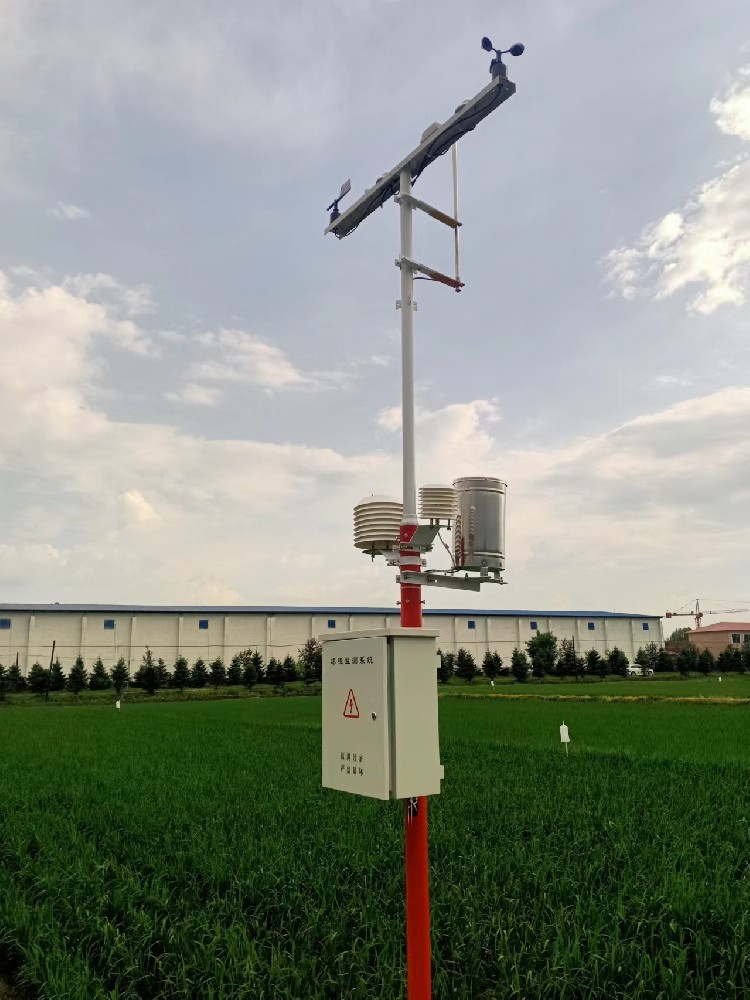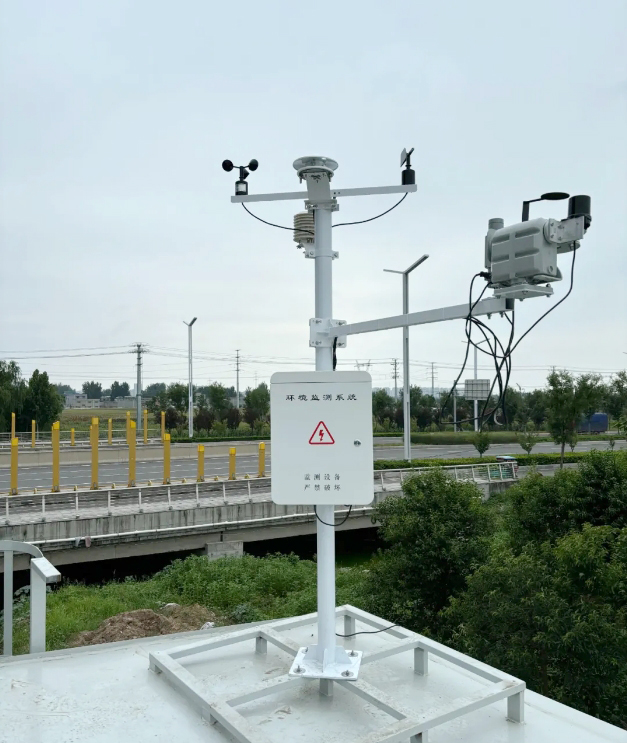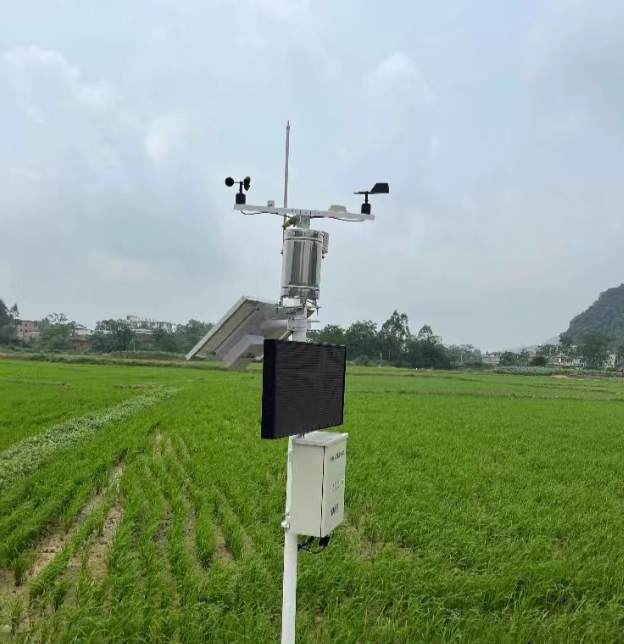

— Blogs —
—Products—
 Consumer hotline +8618073152920
Consumer hotline +8618073152920 WhatsApp:+8615367865107
Address:Room 102, District D, Houhu Industrial Park, Yuelu District, Changsha City, Hunan Province, China
Product knowledge
Time:2024-10-19 12:04:56 Popularity:1318
A weather station is a place dedicated to observing, recording and analyzing weather changes. It is usually equipped with temperature sensors, humidity sensors, barometric pressure sensors, wind speed sensors, wind direction sensors and rainfall sensors, data loggers, transmission systems and sometimes a central processing system and other instrumentation, capable of real-time and accurate collection of data on a variety of elements in the atmosphere, including temperature, humidity, barometric pressure, wind speed, wind direction, precipitation and so on. These data are an important basis for weather forecasting, climate research, and decision-making in many fields such as agriculture, aviation, and navigation.
A commercial weather station, also known as a professional weather station or customized weather station, is a special form of weather station designed for commercial applications. It mainly provides professional weather monitoring services for specific industries or customers. Compared with public weather services, commercial weather stations provide more detailed and accurate services and can be customized to meet specific customer needs. Commercial weather stations are usually operated by weather service providers or scientific research institutes, and their data and analysis results can be used in a variety of ways, such as production scheduling, risk management, and resource planning.
- Temperature and humidity sensors: monitor environmental conditions, critical for warehousing, logistics, food storage and processing, etc. and outdoor activities.
- Wind speed and direction sensors: critical for safety in industries such as aviation, marine, building construction and outdoor advertising.
- Barometric pressure sensors: predicting changes in the weather, important for the agriculture, tourism and transportation industries.
- Rainfall sensors: such as bucket rainfall sensors, critical for agricultural irrigation, water management, and urban flood planning.
- Visibility sensors: critical for traffic management and aviation safety.
- Light sensors: measure light intensity, which is important for studying light conditions and hours of sunlight, and has a direct impact on agricultural planning.
- Solar radiation sensors: measure radiant energy in the ground and atmosphere, including solar radiation and reflected radiation from the surface, which has a direct impact on solar power generation.
- Ultraviolet sensors: monitor the intensity of ultraviolet light, which has a role in outdoor activity planning and health protection.
In addition, other types of sensors, such as soil temperature and humidity sensors, air quality sensors, etc., can be added according to the special needs of customers.
Commercial weather stations need these sensors to collect real-time, accurate data on various weather elements. These data are the basis of weather forecasting models and an important basis for business decisions. By configuring a variety of sensors, commercial weather stations can provide more comprehensive and detailed weather monitoring services to meet the diverse needs of customers.
Weather Station for business provides customized, high-precision weather information to help companies optimize their operational strategies, such as adjusting flight schedules, arranging crop irrigation, ensuring the safety of outdoor activities, and adjusting logistic routes to avoid inclement weather, so as to minimize losses and improve efficiency and customer satisfaction.
1. Provide accurate weather data: Weather Station for business is able to collect data of various weather elements in real time and accurately through the configuration of a variety of high-precision sensors, providing customers with reliable weather information.
2. Supporting refined decision-making: The data and analysis results provided by the commercial weather station can be used for production scheduling, risk management, resource planning and other aspects of the enterprise, helping the enterprise to make more refined decisions.
3. Improve operational efficiency: Through real-time monitoring and analysis of meteorological data, enterprises can adjust production plans and optimize resource allocation in a timely manner, thus improving operational efficiency. Such as logistics scheduling, energy allocation, etc.
4. Reduce operational risks: Commercial weather stations can provide early warning information to help enterprises take countermeasures in advance to reduce operational risks due to severe weather. Reduce the risk of property damage and personnel safety.
5. Cost control: Reduce unnecessary maintenance and emergency preparedness costs through accurate forecasting.
6. Market competitiveness: Provide weather-based personalized services to enhance customer experience.
7. Decision support: Provide a scientific basis for strategic planning, especially in industries such as agriculture, tourism and retail.
8. Enhance customer experience: For example, retail industry can adjust product display and promotion activities according to weather conditions.

1. Agricultural production: Weather Station for business can provide accurate weather forecast and meteorological monitoring services for agricultural production, helping farmers to rationally arrange agricultural activities and improve crop yield and quality.
2. Aviation and navigation: in the field of aviation and navigation, commercial weather stations can provide real-time weather data and analysis results to help airlines, shipping companies and other companies to make safe flight and navigation decisions.
3. energy industry: in the field of renewable energy such as wind and solar energy, commercial weather stations can provide accurate weather forecast data to help energy companies optimize power generation plans and improve power generation efficiency.
4. Construction industry: Commercial weather stations can provide accurate weather data for the construction industry, helping construction companies to rationalize construction schedules and reduce construction risks.
5. logistics industry: through real-time monitoring and analysis of weather data, the logistics industry can optimize transportation routes, reduce transportation costs and ensure the safe transportation of goods.
6. Tourism industry: Adjusting itineraries and services according to weather forecasts improves customer satisfaction.
7. Retail and advertising: Adjust outdoor activities and marketing strategies according to the weather.
Data transmission from commercial weather stations usually involves the following steps:
- Various sensors in a weather station monitor weather elements such as temperature, humidity, wind speed, wind direction, barometric pressure, precipitation, etc. in real time.
- The sensors convert the monitored physical quantities into electrical signals. 2.
- The data logger or microprocessor receives the electrical signals from the sensors.
- These signals are processed and converted into readable digital data within the logger.
- The processed data are usually saved on the local storage device of the weather station for subsequent analysis and backup.

- Data transmission can be performed in several ways:
- Ethernet: The weather station is directly connected to the local network or the Internet via an Ethernet cable.
- Serial communication: Data is transferred to a computer or other device using a serial interface such as RS-232 or RS-485.
- Wi-Fi: The weather station connects to the Internet via Wi-Fi to upload data to a server.
- Cellular: Data is sent to a remote server using a mobile network such as 3G, 4G or 5G.
- Satellite communication: Use satellite communication to transmit data in remote areas or mobile weather stations.

- Data is transmitted to a remote server or cloud platform.
- At the server side, the data can be further processed, analyzed and visualized.
- Enterprises or users can access the data through web interfaces, mobile applications or other customized software.
- Encryption (e.g., SSL/TLS) is often used during data transmission to ensure data security and privacy.
- Access control measures are also implemented to ensure that only authorized users can access weather data.
By taking these steps, commercial weather stations are able to reliably and efficiently transmit real-time weather data to businesses and users who need this information to make decisions based on weather conditions.
As a professional meteorological monitoring service facility, the businessweather station is able to collect and analyze data of various meteorological elements in real time and accurately by configuring a variety of high-precision sensors and advanced data analysis technology. These data not only provide enterprises with reliable weather information support, but also help them make more refined decisions, improve operational efficiency and reduce operational risks, enhance customer experience and save costs. In the application scenarios of commercial weather stations, we can see that it plays an important role in many fields such as agricultural production, aviation and navigation, energy industry, construction industry and logistics industry.
Related recommendations
Sensors & Weather Stations Catalog
Agriculture Sensors and Weather Stations Catalog-NiuBoL.pdf
Weather Stations Catalog-NiuBoL.pdf
Related products
 Combined air temperature and relative humidity sensor
Combined air temperature and relative humidity sensor Soil Moisture Temperature sensor for irrigation
Soil Moisture Temperature sensor for irrigation Soil pH sensor RS485 soil Testing instrument soil ph meter for agriculture
Soil pH sensor RS485 soil Testing instrument soil ph meter for agriculture Wind Speed sensor Output Modbus/RS485/Analog/0-5V/4-20mA
Wind Speed sensor Output Modbus/RS485/Analog/0-5V/4-20mA Tipping bucket rain gauge for weather monitoring auto rainfall sensor RS485/Outdoor/stainless steel
Tipping bucket rain gauge for weather monitoring auto rainfall sensor RS485/Outdoor/stainless steel Pyranometer Solar Radiation Sensor 4-20mA/RS485
Pyranometer Solar Radiation Sensor 4-20mA/RS485
Screenshot, WhatsApp to identify the QR code
WhatsApp number:+8615367865107
(Click on WhatsApp to copy and add friends)
